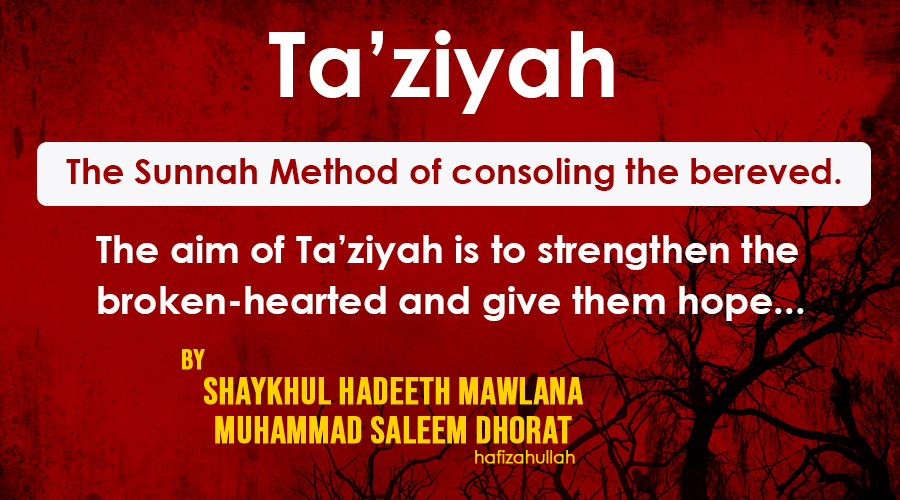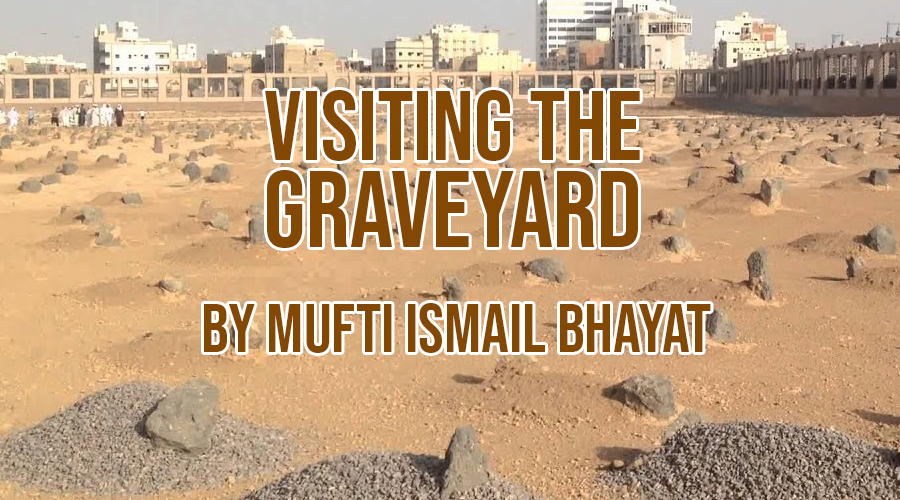
Ta‘ziyah – The Sunnah Method
Islām is a way of life, which guides and assists mankind through every situation. For dealing with moments of grief too, Allāh سُبْحَانَهُ وَ تَعَالَى has conveyed instructions through His Messenger صَلَّى اللّٰهُ عَلَيْهِ وَسَلَّمَ. There can be few instances that cause greater grief than the death of a loved one. Following the instructions brought by Rasūlullāh s will help lessen the grief and sorrow of the bereaved immensely, and make those who console them worthy of great reward. This is done through the Sunnah of ta‘ziyah.
What is Ta‘ziyah?
Ta‘ziyah means to console, comfort and give solace to someone who is suffering grief. The Islamic concept of ta‘ziyah at the time of someone’s death is one of consoling the bereaved with such words or actions as will remove or lessen their grief. The aim of ta‘ziyah is to strengthen the broken-hearted and give them hope at a time when their hope may be waning; it is to lighten the load of the bereaved. To say or do things that augment or reawaken grief is not ta‘ziyah, it is taklīf (giving hardship to others).
Virtues of Ta‘ziyah
There are great rewards for ta‘ziyah. Rasūlullāh s said: A Muslim who consoles his brother will be clothed with garments of honour by Allāh on the Day of Qiyāmah. (Al-Bayhaqī) Whoever consoles a bereaved mother will be dressed in a (special) garment in Paradise. (Al- Tirmidhi)
Whoever consoles an afflicted person will receive the same reward (as the sufferer upon his sabr). (Al- Tirmidhi)
When a Muslim is afflicted with a difficulty of any sort, be it the loss of a loved one or any other hardship, and he bears it patiently then Allāh سُبْحَانَهُ وَ تَعَالَى rewards him for his patience. From this ḥadīth we learn that one who consoles an afflicted person receives the same reward that the afflicted person receives due to his patience. The patience exercised by a bereaved person, and consequently the reward, is obviously great, therefore the reward of someone who consoles the bereaved through the sunnah of ta‘ziyah is also great.
How to Carry Out Ta‘ziyah
There are no set words for ta‘ziyah. One should visit the bereaved and console them, bearing in mind the following points: (Ta‘ziyah can also be performed over the phone if necessary or by letter.)
- a) Encourage patience, reminding the bereaved of the virtues of patience.
- b) Make du‘ā for the bereaved, asking Allāh سُبْحَانَهُ وَ تَعَالَى to grant them reward in return for their loss. A du‘ā that can be read is:
A‘ẓamallāhu ajraka wa aḥsana ‘azā’aka wa ghafara li mayyitika
May Allāh increase your reward, and grant you good consolation, and forgive your deceased.
Note: In cases where the deceased is a minor, not yet bāligh, the last part of the du‘ā (wa ghafara li mayyitik) is omitted, as the question of forgiveness for a minor does not arise. The parents should also be reminded that Rasūlullāh s said that when a child passes away he intercedes for his parents before Allāh سُبْحَانَهُ وَ تَعَالَى and takes them into Jannah.
- c) Make du‘ā for the deceased, an act that will bring cheer to the hearts of the bereaved.
- d) Mention the positive aspects of the situation for both the bereaved and the deceased. Ibn ‘Abbās t says that at the time of his father’s death, a Bedouin was able to console him as no one else had been able to. The Bedouin recited a poem, the last part of which was: ‘Better for you than ‘Abbās is the reward you will receive after him, and Allāh is better than you for ‘Abbās.’ Through these words, the grieving son was reminded that although he had suffered a loss, the gain brought by patience is superior to the loss. He was then reminded that his father may have lost the company of his son, but he had gone to meet his Creator. What is better for ‘Abbās t, being with his son or being with Allāh S?
- e) The meaning of the verse ‘to Allāh we belong, and to Him we will return’ should be explained. We all belong to Allāh S, so when he takes one of us away we should not complain. And although we become separated from a loved one, it is only a temporary separation, for we will soon be returning to them. At the demise of his grandson, Rasūlullāh s consoled his daughter with the words
inna lillāhi mā akhadha wa lahū mā a‘ṭā wa kullun ‘indahū bi ‘ajalim-musammā faltaṣbir waltaḥtasib
Whatever Allāh takes is His, and whatever He gives is His, and everything has an appointed time. So be patient and seek rewards. (AlBukhārī)
For the deceased, it is simply a case of their appointed time having arrived; as for those left behind, it is a time to be patient and acquires great reward as a result.
- f) Inform the bereaved that you intend to do some optional good deeds and send the reward to the deceased. This will please and comfort the bereaved.
- g) When going for ta‘ziyah do not inquire into details of the illness or circumstances that preceded the death.
The Time for Ta‘ziyah
According to the Sharī‘ah, there are only three days for ta‘ziyah, i.e. it should only be carried out within the first three days after the death has occurred. There is an exception for people who live far away, or are out of the country or sick and so are unable to attend within the first three days: they may come for ta‘ziyah even after three days.
The intent of the Sharī‘ah is to allow people to forget their grief, not have them sitting around nursing it indefinitely. For this reason, it is sunnah for an individual to go only once for ta‘ziyah. The fuqahā have written that as soon as the burial has been completed, the bereaved should get back into the normal routine of their lives, one of its benefits being that it prevents the prolonged coming and going of visitors, which only serves to keep the grief alive when it should be forgotten.
It is sunnah for neighbours or friends to prepare food for the immediate family of the deceased during their moment of grief. This should be done for one day, though it is also permissible to do so for the full three days. The objective is to lighten the burden of the bereaved and ensure that food is available for them at a time when they may be too distraught to keep track of mealtimes.
Sending Reward for the Deceased
Another important point to remember during the time of bereavement is īṣāl-ath-thawāb. This means to perform some optional good deed, e.g. tilāwah of the Qur’ān, tasbīḥ, ṣadaqah or nafl ṣalāh, and then to ask Allāh سُبْحَانَهُ وَ تَعَالَى to send its reward to the deceased. When hearing of someone’s demise, along with ta‘ziyah, one’s time is best spent in īṣāl-ath-thawāb. The fuqahā have written that ṣadaqah (giving in charity) is the best way of doing īṣāl-ath-thawāb, one reason being that by spending on something that will be of lasting benefit to people, the deceased will earn a perpetual reward.
These points cover the sunnah method of ta‘ziyah. It is a simple and effective way of helping those suffering losses. Any other practices or customs that may be carried out in the name of ta‘ziyah are baseless.



